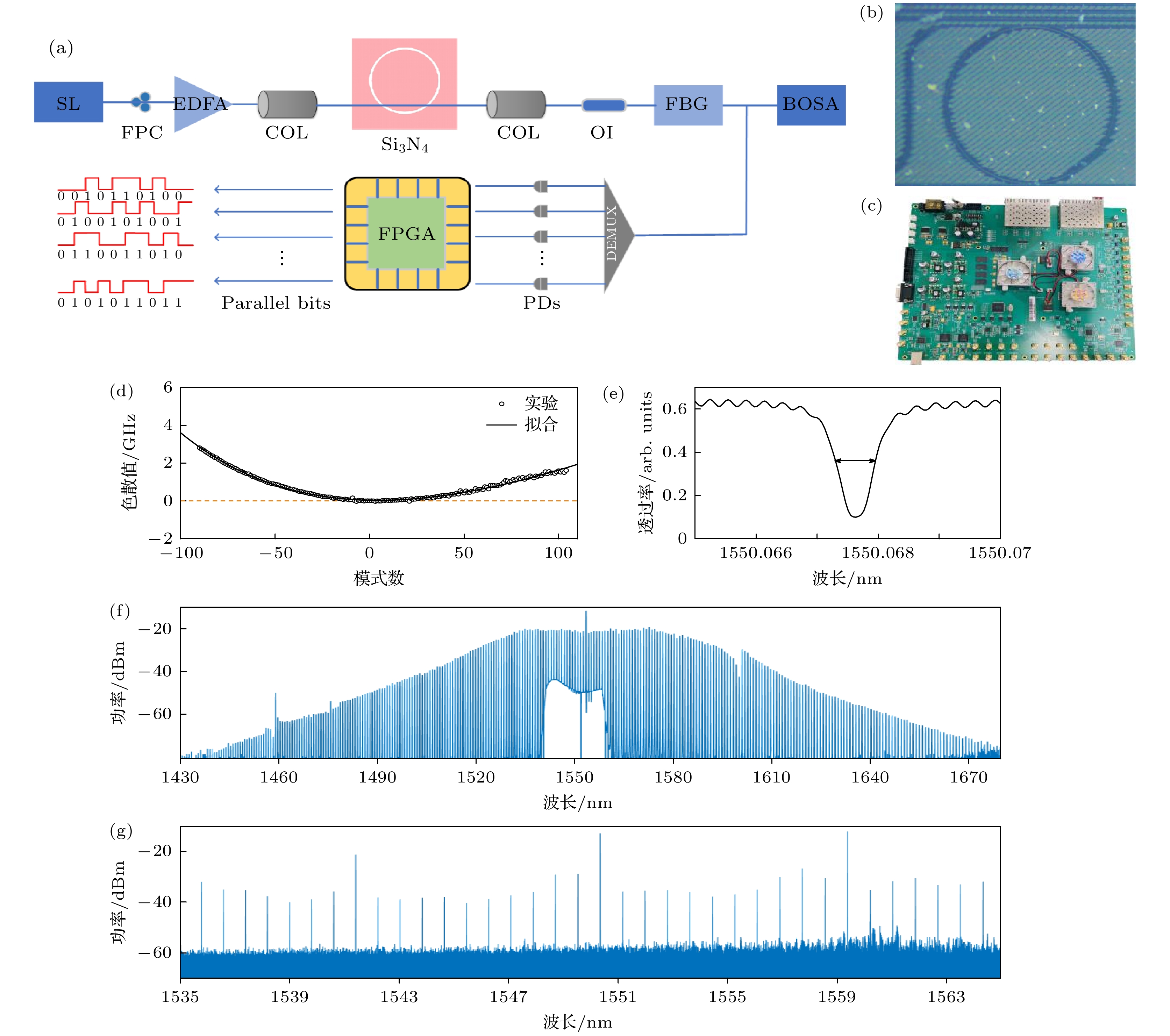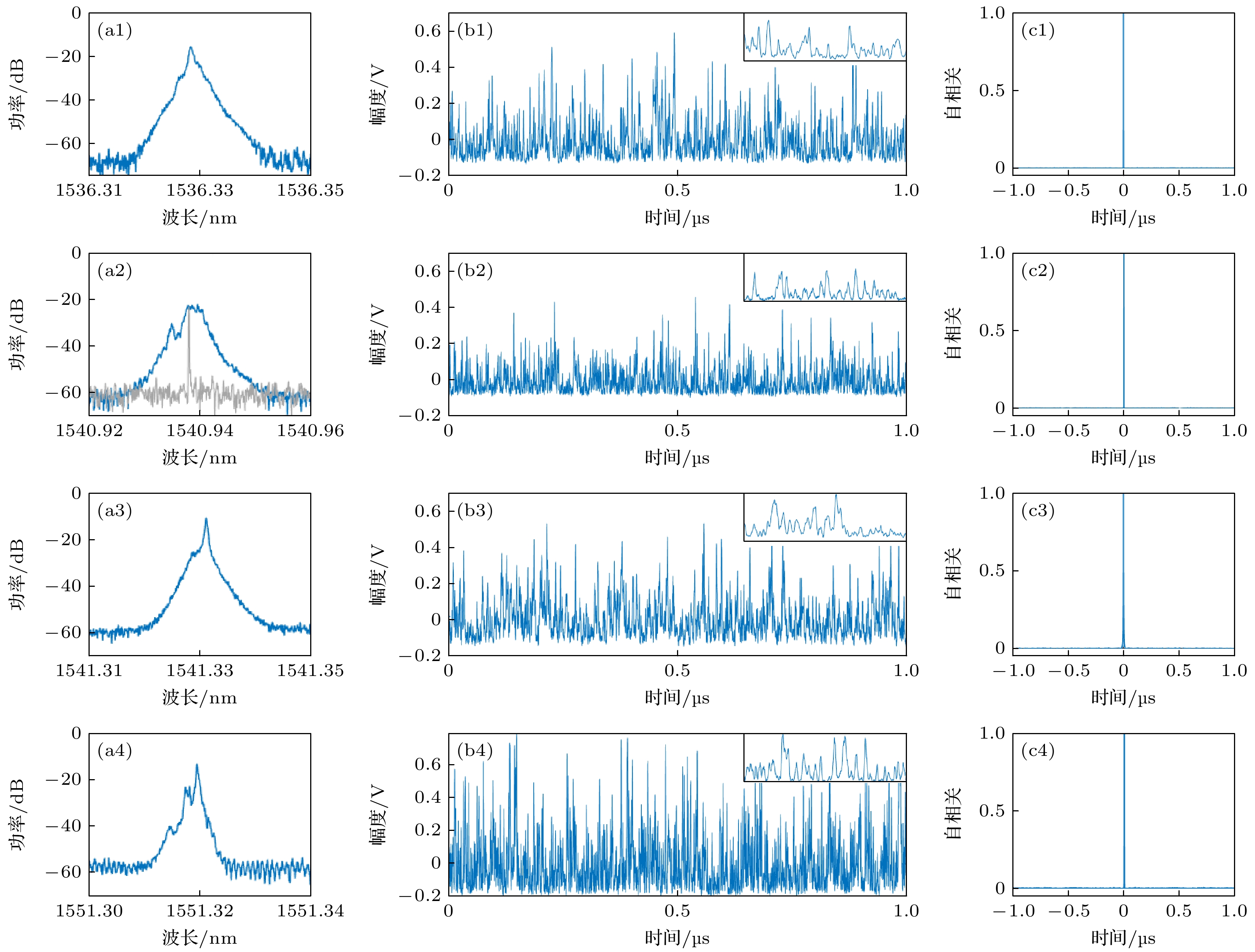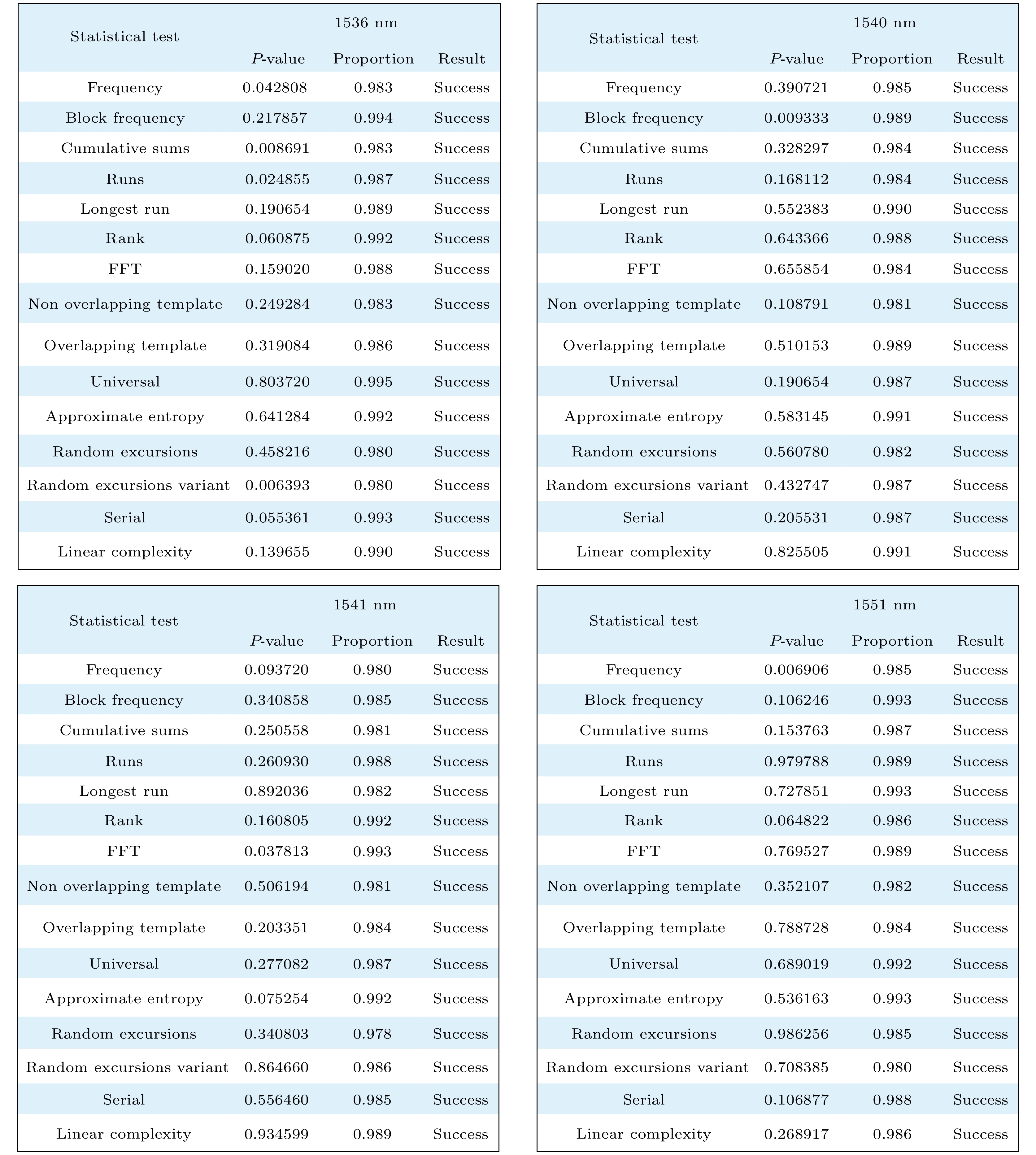-
本文结合片上Si3N4超高Q微环的混沌光频梳和高速现场可编程门阵列, 提出并实验验证了一种超高速的并行实时物理随机数方案. 结果表明, Si3N4超高Q微环实验得到的光频梳齿包含数百个信道, 通过调节Si3N4微环的工作状态使其处于光学混沌态, 从而成为性能优良的物理熵源. 采用现场可编程门阵列(FPGA) 板载的多位模数转换器, 对滤波后频梳的光混沌信号进行离散采样量化, 生成8位二进制比特流. 对该比特流进行实时的自延迟异或处理, 并保留4位最低有效位, 实验最终实现了单信道实时速率达5 Gbits/s的合格物理随机比特流. 结合实验中数目达294的混沌光频梳齿, 本方案的并行实时随机数的吞吐量可望达到1.74 Tbits/s. 这些结果可为实时物理随机数源提供集成、超高速的新可选方案.
Physical random numbers (PRNs) own various advantageous characteristics, including unpredictability, non-repeatability, higher security and reliability. Meanwhile, laser chaos has attracted great attention in the field of PRN. In terms of single channel PRN, laser chaos schemes can achieve a much higher bit-rate than traditional quantum PRN schemes. So far, various laser chaos PRN schemes have been discussed in order to enhance the performance of single channel laser chaos PRN. However, considering the limited bandwidth of laser chaos, especially the bandwidth of digital electronic circuit, the development potential of single channel PRN should be limited and may fall into the trap of high performance and expensive cost. Recently, the applications of multi-channel parallel PRN schemes have been developed. These parallel types may balance the high performance of PRN in a low cost. Recent progress indicates that chaotic micro-comb may have good potential. The micro-comb exhibits highly nonlinear and complex dynamic characteristics, and each comb tooth may show chaotic oscillation. The wavelength division multiplexing technology enables large-scale optical parallel output, providing the possiblity for large-scale parallel PRN generation. However, most of these PRN schemes are offline rather than true online and real-time random numbers. Thus, the development of real, online real-time parallel PRN solutions has great interest and research value in related fields. Herein we experimentally demonstrat an ultra-high-speed parallel real-time physical random number generator, which is achieved though the combination of chaotic micro-comb of chip-scale Si3N4 ultra-high Q micro-resonator and a high-speed field programmable gate array (FPGA). The results show that the Si3N4 ultra-high Q micro-resonator generates a micro-comb with hundreds of channels, each channel can route into an optically chaotic state, and become an excellent physical entropy source. Using FPGA onboard multi-bit analog-to-digital converter, the filtered optical chaos signal from the micro-comb is discretely sampled and quantized, and resulting in an 8-bit binary bitstream. Taking real-time self-delayed exclusive or (XOR) processing of bitstream and preserving 4 least significant bits, the qualified physical random bitstream with real-time 5 Gbits/s rate is realized experimentally. Considering that there are 294 chaotic comb teeths, our approach anticipates a throughput of 1.74 Tbits/s of real-time physical random bits. Our results could offer a new integrated and ultra-high-speed option for real-time physical random number sources. -
Keywords:
- physical random number /
- real-time /
- chaos /
- optical frequency comb /
- field programmable gate array
[1] Argyris A, Syvridis D, Larger L, Annovazzi-Lodi V, Colet P, Fischer I, Garcia-Ojalvo J, Mirasso C, Pesquera L, Shore K A 2005 Nature 438 343
 Google Scholar
Google Scholar
[2] Wang L S, Mao X X, Wang A B, Wang Y C, Gao Z S, Li S S, Yan L S 2020 Opt. Lett. 45 4762
 Google Scholar
Google Scholar
[3] Garcia-Ojalvo J, Roy R 2001 Phys. Rev. Lett. 86 5204
 Google Scholar
Google Scholar
[4] Gao H, Wang A B, Wang L S, Jia Z W, Guo Y Y, Gao Z Z, Yan L S, Qin Y W, Wang Y C 2021 Light. Sci. Appl. 10 172
 Google Scholar
Google Scholar
[5] Feng W Z, Jiang N, Zhang Y Q, Jin J Y, Zhao A K, Liu S Q, Qiu K 2022 Opt. Express 30 4782
 Google Scholar
Google Scholar
[6] Cheng C H, Chen Y C, Lin F Y 2015 IEEE Photon. J. 8 1
[7] Lin F Y, Liu J M 2004 IEEE J. Sel. Top. Quant. Electron. 10 991
 Google Scholar
Google Scholar
[8] Chen J D, Wu K W, Ho H L, Lee C T, Lin F Y 2022 IEEE J. Sel. Top. Quant. Electron. 28 1
 Google Scholar
Google Scholar
[9] Uchida A, Amano K, Inoue M, Hirano K, Naito S, Someya H, Oowada I, Kurashig T, Shiki M, Yoshimori S, Yoshimura K, Davis P 2008 Nat. Photonics 2 728
 Google Scholar
Google Scholar
[10] Reidler I, Aviad Y, Rosenbluh M, Kanter I 2009 Phys. Rev. Lett. 103 024102
 Google Scholar
Google Scholar
[11] Hirano K, Yamazaki T, Morikatsu S, Okumura H, Aida H, Uchida A, Yoshimori S, Yoshimura K, Harayama T, Davis P 2010 Opt. Express 18 5512
 Google Scholar
Google Scholar
[12] Sakuraba R, Iwakawa K, Kanno K, Uchida A 2015 Opt. Express. 23 1470
 Google Scholar
Google Scholar
[13] Zhang L, Pan B, Chen G, Guo L, Lu D, Zhao L, Wang W 2017 Sci. Rep. 7 1
 Google Scholar
Google Scholar
[14] Wu J G, Tang X, Wu Z M, Xia G Q, Feng G Y 2012 Laser. Phys. 22 1476
 Google Scholar
Google Scholar
[15] Tang X, Wu Z M, Wu J G, Deng T, Chen J J, Fan L, Zhong Z Q, Xia G Q 2015 Opt. Express 23 33130
 Google Scholar
Google Scholar
[16] Han Y N, Xiang S Y, Wang Y, Wang Y T, Wang B, Wen A J, Hao Y 2020 Photon. Res. 8 1792
 Google Scholar
Google Scholar
[17] Zhao A K, Jiang N, Peng J F, Liu S Q, Zhang Y Q, Qiu K 2022 Opto-Electron. Adv. 5 200026
 Google Scholar
Google Scholar
[18] 吴佳辰, 宋峥, 谢溢锋, 周心雨, 周沛, 穆鹏华, 李念强 2021 70 104205
 Google Scholar
Google Scholar
Wu J C, Song Z, Xie Y F, Zou X Y, Zou F, Mu P H, Li N Q 2021 Acta Phys. Sin. 70 104205
 Google Scholar
Google Scholar
[19] Cai Q, Li Q, Shi Y C, Jia Z W, Ma L, Xu B J, Chen X F, Shore A K, Wang Y C 2023 Opt. Laser. Technol. 162 109273
 Google Scholar
Google Scholar
[20] Shi B L, Luo C W, Flores J G F, Lo G Q, Kwong D L, Wu J G, Wong C W 2020 Opt. Express 28 36685
 Google Scholar
Google Scholar
[21] Virte M, Mercier E, Thienpont H, Panajotov K, Sciamanna M 2014 Opt. Express 22 17271
 Google Scholar
Google Scholar
[22] 赵清春, 殷洪玺 2013 激光与光电子学进展 50 23
Zhao Q C, Yin H X 2013 Laser Optoelectron. Prog. 50 23
[23] Li P, Li K Y, Guo X M, Guo Y Q, Liu Y M, Xu B J, Bogris A, Shore A K, Wang Y C 2019 Opt. Lett. 44 2447
[24] Qiao L J, Lv T S, Xu Y, Zhang M J, Zhang J Z, Wang T, Zhou R K, Wang Q, Xu H C 2019 Opt. Lett. 44 5394
 Google Scholar
Google Scholar
[25] Wang L S, Zhao T, Wang D M, Wu D Y, Zhou L, Wu J, Liu X Y, Wang Y C, Wang A B 2017 IEEE Photon. J. 9 1
[26] Li X Z, Chan S C 2013 IEEE. J. Quantum. Electron. 49 829
 Google Scholar
Google Scholar
[27] Ji X C, Yao X W, Klenner A, Gan Y, Gaeta A L, Hendon C P, Lipson M 2019 Opt. Express 27 19896
 Google Scholar
Google Scholar
[28] Marchand P J, Riemensberger J, Skehan J C, Ho J J, Pfeiffer M H P, Liu J Q, Hauger C, Lasser T, Kippenberg T J 2021 Nat. Commun. 12 427
[29] 王龙生, 赵彤, 王大铭, 吴旦昱, 周磊, 武锦, 刘新宇, 王安帮 2017 66 234205
 Google Scholar
Google Scholar
Wang L S, Zhao T, Wang D M, Wu D L, Zou L, Wu J, Liu X Y, Wang A B 2017 Acta Phys. Sin. 66 234205
 Google Scholar
Google Scholar
[30] Ugagin K, Terashime Y, Iwakawa K, Uchida A, Harayama T, Yoshimura K, Inubushi M 2017 Opt. Express 25 6511
 Google Scholar
Google Scholar
[31] Yang J, Liu J N, Su Q, Li Z Y, Fan F, Xu B J, Guo H 2016 Opt. Express 24 27475
 Google Scholar
Google Scholar
[32] Peccianti M, Pasquazi A, Park Y, Little B E, Chu S T, Moss D J, Morandotti R 2012 Nat. Commun. 3 765
 Google Scholar
Google Scholar
[33] Chang L, Liu S, Bowers J E 2022 Nat. Photonics 16 95
 Google Scholar
Google Scholar
[34] Xiao Z Y, Li T, Cai M, Zhang H, Huang Y, Li C, Yao B, Wu K, Chen J 2023 Light Sci. Appl. 12 33
 Google Scholar
Google Scholar
[35] Shen B T, Shu H W, Xie W Q, Chen R X, Liu Z, Ge Z F, Zhang X G, Wang Y M, Zhang Y H, Cheng B W, Yu S H, Chang L, Wang X J 2023 Nat. Commun. 14 4590
 Google Scholar
Google Scholar
-
图 1 基于混沌光频梳的实时大规模并行混沌信号生成 (a) 基于大规模并行光子集成电路实时PRN发生器实验装置, 其中SL为半导体激光器, FPC为光纤偏振控制器, EDFA为掺铒光纤放大器, COL为准直镜头, OI为光隔离器, FBG为光纤布拉格光栅, DEMUX为多路分配器, PD为光电探测器, BOSA为布里渊光谱分析仪; (b) Si3N4微谐振器图像; (c) FPGA电子板; (d) 色散曲线; (e) 冷腔传输曲线; (f) 生成的混沌梳的光谱; (g) 混沌微梳从1535 nm放大到1565 nm
Fig. 1. Microcomb based real-time massively parallel chaotic signal generation: (a) Experimental setup for real-time PRN generator with massively parallel photonic integrated circuit, SL represents semiconductor laser, FPC represents fiber polarization controller, EDFA represents erbium-doped optical fiber amplifier, COL represents collimating lens, OI represents isolator, FBG represents fiber Bragg grating, DEMUX represents demultiplexer, PD represents photodetector, BOSA represents Brillouin optical spectral analyzer; (b) image of Si3N4 microresonator; (c) FPGA electronic board; (d) dispersion curve; (e) cold cavity transmission line; (f) the optical spectrum of the generated chaotic comb; (g) zoom in of chaotic microcomb covering from 1535 nm to 1565 nm.
图 2 不同波长单信道梳齿的光谱、对应的时间序列和时间序列的自相关 (a1), (b1), (c1) 1536.33 nm; (a2), (b2), (c2) 1540.94 nm, 其中蓝色曲线表示混沌态, 灰色曲线表示稳定态; (a3), (b3), (c3) 1541.33 nm; (a4), (b4), (c4) 1551.32 nm
Fig. 2. The spectrum of a single optical frequency comb with different wavelengths, the corresponding time sequence, and the autocorrelation of time sequence: (a1), (b1), (c1) 1536.33 nm; (a2) , (b2), (c2) 1540.94 nm, the blue curve represents the chaotic state, while the grey curve represents the stable state; (a3), (b3), (c3) 1541.33 nm; (a4), (b4), (c4) 1551.32 nm.
图 3 实时随机位的生成 (a) 混沌梳齿熵源实时后处理流程图; (b) 熵源采样量化后序列的直方图; (c) 4-LSB处理下比特序列前1 M点的二维图, 格式为1000×1000, 其中位“1”和位“0”分别转换为白点和黑点; (d) 提取的4-LSB分布直方图; (e) 随机比特的码型图; (f) 随机比特对应的眼图
Fig. 3. Generation of real-time random bits: (a) Flow chart of real-time post-processing for the entropy source of chaotic comb tooth; (b) entropy source sampled and quantized sequence histograms; (c) two-dimensional graph generated the first 1 M points in the bits sequence under 4-LSB processing in the form of 1000×1000, where bits“1”and bits“0”are converted into white and black dots, respectively; (d) histograms of distribution of the extracted 4-LSB; (e) temporal waveforms of random bits; (f) eye diagram of random bits.
-
[1] Argyris A, Syvridis D, Larger L, Annovazzi-Lodi V, Colet P, Fischer I, Garcia-Ojalvo J, Mirasso C, Pesquera L, Shore K A 2005 Nature 438 343
 Google Scholar
Google Scholar
[2] Wang L S, Mao X X, Wang A B, Wang Y C, Gao Z S, Li S S, Yan L S 2020 Opt. Lett. 45 4762
 Google Scholar
Google Scholar
[3] Garcia-Ojalvo J, Roy R 2001 Phys. Rev. Lett. 86 5204
 Google Scholar
Google Scholar
[4] Gao H, Wang A B, Wang L S, Jia Z W, Guo Y Y, Gao Z Z, Yan L S, Qin Y W, Wang Y C 2021 Light. Sci. Appl. 10 172
 Google Scholar
Google Scholar
[5] Feng W Z, Jiang N, Zhang Y Q, Jin J Y, Zhao A K, Liu S Q, Qiu K 2022 Opt. Express 30 4782
 Google Scholar
Google Scholar
[6] Cheng C H, Chen Y C, Lin F Y 2015 IEEE Photon. J. 8 1
[7] Lin F Y, Liu J M 2004 IEEE J. Sel. Top. Quant. Electron. 10 991
 Google Scholar
Google Scholar
[8] Chen J D, Wu K W, Ho H L, Lee C T, Lin F Y 2022 IEEE J. Sel. Top. Quant. Electron. 28 1
 Google Scholar
Google Scholar
[9] Uchida A, Amano K, Inoue M, Hirano K, Naito S, Someya H, Oowada I, Kurashig T, Shiki M, Yoshimori S, Yoshimura K, Davis P 2008 Nat. Photonics 2 728
 Google Scholar
Google Scholar
[10] Reidler I, Aviad Y, Rosenbluh M, Kanter I 2009 Phys. Rev. Lett. 103 024102
 Google Scholar
Google Scholar
[11] Hirano K, Yamazaki T, Morikatsu S, Okumura H, Aida H, Uchida A, Yoshimori S, Yoshimura K, Harayama T, Davis P 2010 Opt. Express 18 5512
 Google Scholar
Google Scholar
[12] Sakuraba R, Iwakawa K, Kanno K, Uchida A 2015 Opt. Express. 23 1470
 Google Scholar
Google Scholar
[13] Zhang L, Pan B, Chen G, Guo L, Lu D, Zhao L, Wang W 2017 Sci. Rep. 7 1
 Google Scholar
Google Scholar
[14] Wu J G, Tang X, Wu Z M, Xia G Q, Feng G Y 2012 Laser. Phys. 22 1476
 Google Scholar
Google Scholar
[15] Tang X, Wu Z M, Wu J G, Deng T, Chen J J, Fan L, Zhong Z Q, Xia G Q 2015 Opt. Express 23 33130
 Google Scholar
Google Scholar
[16] Han Y N, Xiang S Y, Wang Y, Wang Y T, Wang B, Wen A J, Hao Y 2020 Photon. Res. 8 1792
 Google Scholar
Google Scholar
[17] Zhao A K, Jiang N, Peng J F, Liu S Q, Zhang Y Q, Qiu K 2022 Opto-Electron. Adv. 5 200026
 Google Scholar
Google Scholar
[18] 吴佳辰, 宋峥, 谢溢锋, 周心雨, 周沛, 穆鹏华, 李念强 2021 70 104205
 Google Scholar
Google Scholar
Wu J C, Song Z, Xie Y F, Zou X Y, Zou F, Mu P H, Li N Q 2021 Acta Phys. Sin. 70 104205
 Google Scholar
Google Scholar
[19] Cai Q, Li Q, Shi Y C, Jia Z W, Ma L, Xu B J, Chen X F, Shore A K, Wang Y C 2023 Opt. Laser. Technol. 162 109273
 Google Scholar
Google Scholar
[20] Shi B L, Luo C W, Flores J G F, Lo G Q, Kwong D L, Wu J G, Wong C W 2020 Opt. Express 28 36685
 Google Scholar
Google Scholar
[21] Virte M, Mercier E, Thienpont H, Panajotov K, Sciamanna M 2014 Opt. Express 22 17271
 Google Scholar
Google Scholar
[22] 赵清春, 殷洪玺 2013 激光与光电子学进展 50 23
Zhao Q C, Yin H X 2013 Laser Optoelectron. Prog. 50 23
[23] Li P, Li K Y, Guo X M, Guo Y Q, Liu Y M, Xu B J, Bogris A, Shore A K, Wang Y C 2019 Opt. Lett. 44 2447
[24] Qiao L J, Lv T S, Xu Y, Zhang M J, Zhang J Z, Wang T, Zhou R K, Wang Q, Xu H C 2019 Opt. Lett. 44 5394
 Google Scholar
Google Scholar
[25] Wang L S, Zhao T, Wang D M, Wu D Y, Zhou L, Wu J, Liu X Y, Wang Y C, Wang A B 2017 IEEE Photon. J. 9 1
[26] Li X Z, Chan S C 2013 IEEE. J. Quantum. Electron. 49 829
 Google Scholar
Google Scholar
[27] Ji X C, Yao X W, Klenner A, Gan Y, Gaeta A L, Hendon C P, Lipson M 2019 Opt. Express 27 19896
 Google Scholar
Google Scholar
[28] Marchand P J, Riemensberger J, Skehan J C, Ho J J, Pfeiffer M H P, Liu J Q, Hauger C, Lasser T, Kippenberg T J 2021 Nat. Commun. 12 427
[29] 王龙生, 赵彤, 王大铭, 吴旦昱, 周磊, 武锦, 刘新宇, 王安帮 2017 66 234205
 Google Scholar
Google Scholar
Wang L S, Zhao T, Wang D M, Wu D L, Zou L, Wu J, Liu X Y, Wang A B 2017 Acta Phys. Sin. 66 234205
 Google Scholar
Google Scholar
[30] Ugagin K, Terashime Y, Iwakawa K, Uchida A, Harayama T, Yoshimura K, Inubushi M 2017 Opt. Express 25 6511
 Google Scholar
Google Scholar
[31] Yang J, Liu J N, Su Q, Li Z Y, Fan F, Xu B J, Guo H 2016 Opt. Express 24 27475
 Google Scholar
Google Scholar
[32] Peccianti M, Pasquazi A, Park Y, Little B E, Chu S T, Moss D J, Morandotti R 2012 Nat. Commun. 3 765
 Google Scholar
Google Scholar
[33] Chang L, Liu S, Bowers J E 2022 Nat. Photonics 16 95
 Google Scholar
Google Scholar
[34] Xiao Z Y, Li T, Cai M, Zhang H, Huang Y, Li C, Yao B, Wu K, Chen J 2023 Light Sci. Appl. 12 33
 Google Scholar
Google Scholar
[35] Shen B T, Shu H W, Xie W Q, Chen R X, Liu Z, Ge Z F, Zhang X G, Wang Y M, Zhang Y H, Cheng B W, Yu S H, Chang L, Wang X J 2023 Nat. Commun. 14 4590
 Google Scholar
Google Scholar
计量
- 文章访问数: 4456
- PDF下载量: 90
- 被引次数: 0














 下载:
下载:



